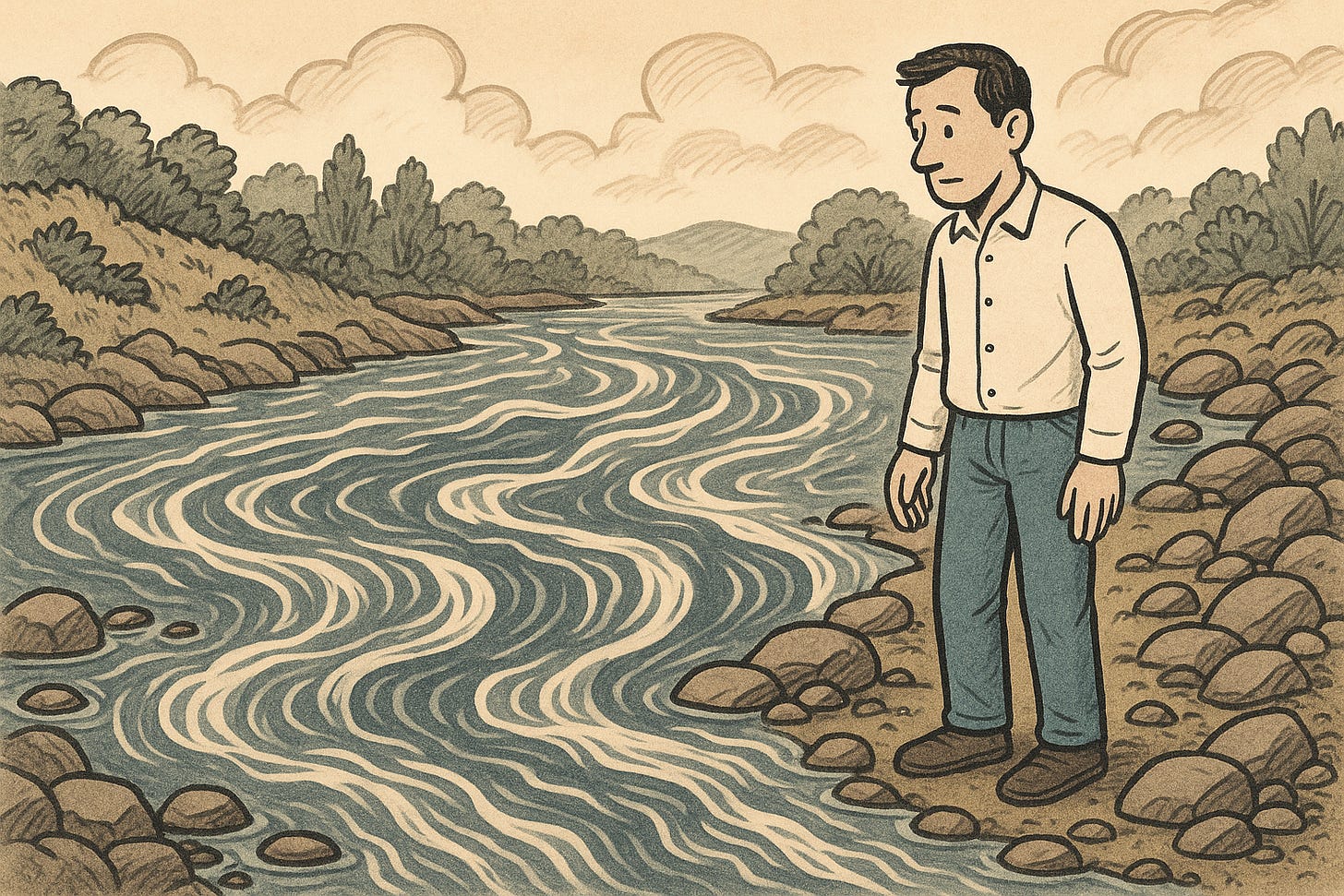Why I Say I Have Autism (and Not That I Am Autistic)
Seeing autism not as a label, but as part of the ongoing dance of being human.
Saying “I have autism” isn’t about ownership or illness. It’s a way of expressing that my relationship with autism is part of how I experience life.
My studies in Buddhism have had a profound impact on me. They’ve taught me to appreciate the interdependence we share with one another and the world around us. Autism, like everything else, is dynamic—more like weather than a diagnosis. It shifts with context, stress, and the environment we’re in.
Heraclitus famously said, “You can’t step in the same river twice,” because it’s always moving. The same is true for autism. We don’t experience it the same way twice. Who we are has as much to do with where we are, what’s happening around us, and how our needs are being met—or not—at any given moment.
Over time, I’ve learned to see myself as an observer of this dynamic dance of life. I’ve learned not to take things personally, to regulate my emotions, and not to take my thoughts too seriously. I’ve also learned to meet my experiences without judgment—with patience, curiosity, and compassion. I didn’t get here through medication or quick fixes. I got here by doing the work.
Saying “I have autism” doesn’t mean I think I have a disease. That metaphor is narrow, dripping with bias, and misses the bigger picture of what it means to be human.
I can list other things “I have” that are simply parts of me:
I have creativity.
I have a sense of humor.
I have integrity.
I have autism.
These are all qualities that coexist, interact, and shape how I move through the world. None of them defines me completely.
I also know others on the spectrum describe themselves differently—“autistic,” “neurodivergent,” or something else entirely. Each carries its own meaning and power, and that’s part of the beauty of self-definition.
Learning to approach life, thoughts, and emotions this way has helped many of my clients quiet the inner critic that kept them stuck at the edge of life—too afraid to risk, try, and grow. Now they’re more confident, grounded, and fully alive.
If this way of seeing yourself resonates, you can learn more about my mentoring approach here. It’s designed to help people step out of self-doubt and into a more compassionate, empowered relationship with themselves.
Sometimes I think about my son, who refers to himself as “autistic.” There’s a reason I don’t correct him or try to make him see it my way. Because it’s not my business, it’s his right to define his own experience. My job is to walk beside him, support him, and trust that he’ll find his own relationship with who he is.
Thanks for being you,
Brian
One Last Thing…
What in this article really resonated with you?
Share this with someone who could use a communication clarification.
Subscribe FREE I write about living and parenting with autism and ADHD from the inside out—sharing real stories, practical tools, and a little humor to make hard stuff easier to hold—so sign up below for grounded insights, fresh resources, and encouragement you can actually use, free.
Upgrade to have access to strategies, stories for members only, and instant access to the practical tools—worksheets, cheatsheets, tip sheets—I’ve built for the real world. Your support powers more than just content. It backs a mission to empower the AuDHD Community with language and resources to live their best lives while being exactly who they are.
How Brian Can Help You…
Get my free guide: Talk to Yourself Like It Matters: 25 Gentle Ways to Improve the Way You Speak to Yourself Every Day. Get 25 simple, powerful tips to quiet self-doubt, shift your inner voice, and show up with more calm — even on the hard days.
Book a no-pressure call. Insight is powerful, but applying it changes everything. Let’s talk about how to turn what you just read into progress that fits your real life. Schedule a discovery call here. Let’s talk.
About the Author
I’m Brian R. King, MSW, a storyteller, coach, and neurodivergent dad who has spent decades helping parents, teachers, and professionals understand and support children with autism and ADHD. Living with autism, ADHD, MS, hEDS, and chronic pain myself, I write from lived experience — not theory. My work involves translating the unspoken, exploring the coexistence of struggle and self-acceptance, and using humor to make difficult truths more palatable.
I keep my writing free because so many of the families and individuals who need it most are already stretched thin. However, creating these resources requires time, energy, and medical supplies, which I must ration carefully. If my work has brought you clarity, relief, or hope, and you’re in a position to help, your support truly makes a difference.
Even a one-time donation — the cost of a coffee — helps me keep showing up and creating.
👉 Support my work with a one-time donation here / PayPal /
Let’s build a world where neurodivergent minds are understood, accepted, and celebrated — together.





To me to say I have creativity or I am creative say the same thing To say I have autism or I am autistic say the same thing or do you think people hear it differently? Neither way does it imply that being autistic is all you are, at least to me. But it gets tricky because although I can say I have ADHD there isn't a form for ADHD where I can say I am ADHDistic Oh well--not sure of the point I am making
This was interesting for me to read. Many of the things you listed would be reasons why I say I'm autistic rather than I have autism. But I'd also say I am creative. I am full of integrity. I relate to claiming these things as part of my identity instead things that might come.
I also think that we all have full rights to think of ourselves, and express who we are, in the way that makes sense to each of us. I don't believe there is a right and a wrong in this conversation. 😊